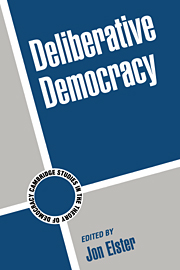Book contents
- Frontmatter
- Contents
- List of Contributors
- Preface and Acknowledgment
- Introduction
- 1 “Claro!”: An Essay on Discursive Machismo
- 2 Deliberation as Discussion
- 3 All Men Are Liars: Is Democracy Meaningless?
- 4 Deliberation and Constitution Making
- 5 Pathologies of Deliberation
- 6 Deliberation and Ideological Domination
- 7 Arguing for Deliberation: Some Skeptical Considerations
- 8 Democracy and Liberty
- 9 Health-Health Trade-offs
- 10 Full Representation, Deliberation, and Impartiality
- Index
2 - Deliberation as Discussion
Published online by Cambridge University Press: 05 June 2012
- Frontmatter
- Contents
- List of Contributors
- Preface and Acknowledgment
- Introduction
- 1 “Claro!”: An Essay on Discursive Machismo
- 2 Deliberation as Discussion
- 3 All Men Are Liars: Is Democracy Meaningless?
- 4 Deliberation and Constitution Making
- 5 Pathologies of Deliberation
- 6 Deliberation and Ideological Domination
- 7 Arguing for Deliberation: Some Skeptical Considerations
- 8 Democracy and Liberty
- 9 Health-Health Trade-offs
- 10 Full Representation, Deliberation, and Impartiality
- Index
Summary
If one begins with “deliberative democracy,” one is immediately drawn toward trying to define the term, and hence into arguments about how precisely it should be understood. While such arguments can be enlightening and are surely unavoidable for anyone interested in the subject, I will try a different approach here, one that bypasses the problem of deciding what should count as deliberation and deliberative democracy. Instead, I will consider the following question. What good reasons might a group of people have for discussing matters before making some collective decision, rather than simply voting on the issue or using some other decision rule that does not involve discussion? In other words, what is the point or value of discussing things before making political decisions?
Put in these terms, the question may seem trivial, but I will suggest that spelling out answers is a valuable exercise for anyone interested in the more academic idea of deliberative democracy. This is especially so if we keep in mind the contrast between discussing a decision before voting on it or otherwise deciding, and simply voting without benefit of discussion.
I see six major reasons or arguments for discussing a matter before reaching a decision on what to do. There are surely more, but I think these six constitute the most important ones and they certainly provide an interesting set of issues to examine.
Information
- Type
- Chapter
- Information
- Deliberative Democracy , pp. 44 - 68Publisher: Cambridge University PressPrint publication year: 1998
Accessibility standard: Unknown
- 175
- Cited by
